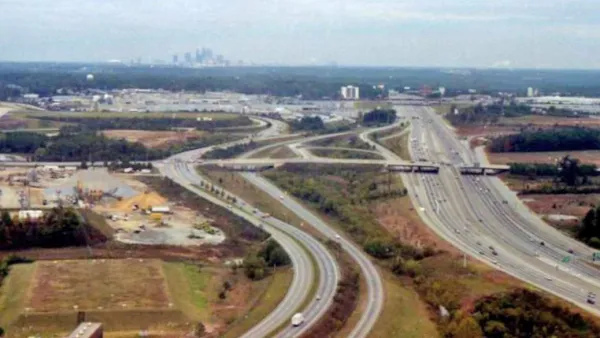Robert Bruegmann, professor emeritus of art history, architecture, and urban planning at the University of Illinois at Chicago, defends the recent attacks against Atlanta, especially regarding its sprawling footprint.
"The most recent confirmation of Atlanta’s status as an icon of American sprawl," according to Robert Bruegmann, "comes in a new report from Smart Growth America called 'Measuring Sprawl 2014.'" The report found Atlanta to be the country's most sprawling metro, compared with New York City's least sprawling metro.
Bruegmann, however, rejects many of the study's findings, and insists that Atlanta's doubters have it wrong.
"You would think from the commentary that Atlanta is flat on its back. In fact, of course, Atlanta, over the last half century, has obviously seen its population and its economy grow faster than most of the older, higher-density, more transit-oriented cities of the United States or Europe. It must be doing something right, perhaps including the way it has sprawled."
Bruegmann claims that traffic congestion is usually worse in dense urban areas, before providing possible explanations for why Atlanta performs worse in congestion than he expects from a less-dense area. Here's a sample: "Infrastructure almost always lags in places that experience extremely fast population and economic growth. In other words, traffic congestion is, in part, an almost inevitable by-product of Atlanta’s undeniable and enviable economic success."
Bruegmann also prescribes some do's and don't's for the cities ongoing approach to the problem of congestion.
FULL STORY: Sprawl Is Good for You

National Parks Layoffs Will Cause Communities to Lose Billions
Thousands of essential park workers were laid off this week, just before the busy spring break season.

Retro-silient?: America’s First “Eco-burb,” The Woodlands Turns 50
A master-planned community north of Houston offers lessons on green infrastructure and resilient design, but falls short of its founder’s lofty affordability and walkability goals.

Delivering for America Plan Will Downgrade Mail Service in at Least 49.5 Percent of Zip Codes
Republican and Democrat lawmakers criticize the plan for its disproportionate negative impact on rural communities.

Test News Post 1
This is a summary

Test News Headline 46
Test for the image on the front page.

Balancing Bombs and Butterflies: How the National Guard Protects a Rare Species
The National Guard at Fort Indiantown Gap uses GIS technology and land management strategies to balance military training with conservation efforts, ensuring the survival of the rare eastern regal fritillary butterfly.
Urban Design for Planners 1: Software Tools
This six-course series explores essential urban design concepts using open source software and equips planners with the tools they need to participate fully in the urban design process.
Planning for Universal Design
Learn the tools for implementing Universal Design in planning regulations.
EMC Planning Group, Inc.
Planetizen
Planetizen
Mpact (formerly Rail~Volution)
Great Falls Development Authority, Inc.
HUDs Office of Policy Development and Research
NYU Wagner Graduate School of Public Service




























